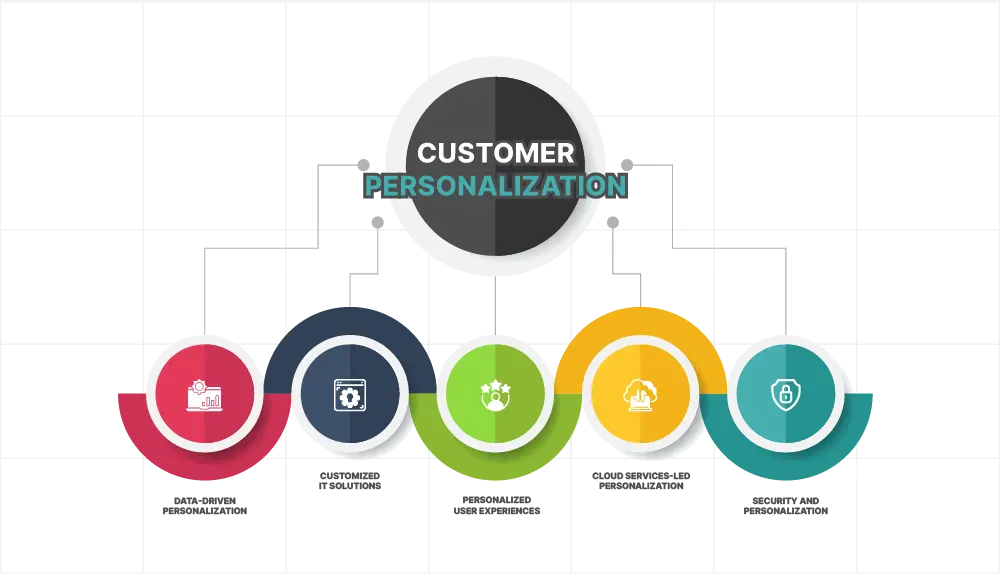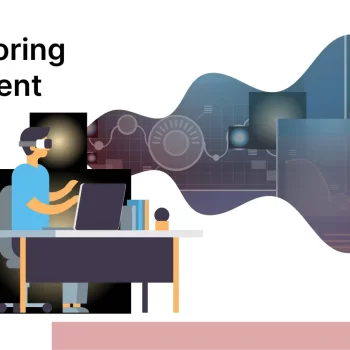Undoubtedly, in the current market, personalization is key to enhancing customer experiences. Therefore, Managed Service Providers (MSPs) are becoming increasingly sought after for their ability to help deliver personalized services that cater to the specific needs of customers. By leveraging data analytics, cloud technology, AI, and ML, they can provide customized solutions and services that meet unique needs. As technology continues to evolve, MSPs must find innovative ways to deliver such custom experiences.
Let’s explore how they get it done.
Related blog: How IT Managers and MSPs can drive transformation with Remote Monitoring and Management (RMM)
5 ways MSPs can help achieve customer personalization

Data-driven personalization
Managed Service Providers (MSPs) harness extensive data analytics to deeply understand customer behaviors, preferences, and requirements. The process is multi-layered and comprises several critical steps:
- Collecting Data: MSPs gather a vast array of data from diverse sources, including direct user interactions, service usage patterns, customer feedback channels, and social media engagement. The data collected is both quantitative and qualitative, providing a comprehensive view of customer behavior and preferences.
- Analyzing Data: Utilizing advanced analytics tools and statistical techniques, MSPs analyze the gathered data. The analysis is based on sophisticated methods like predictive analytics, sentiment analysis, and machine learning algorithms. The objective is to identify underlying trends, patterns, and customer preferences, which are often not apparent at the surface level.
- Applying Insights: The insights gained from detailed data analysis are then applied to personalize services and customer interactions. It could mean tailoring communication strategies, customizing service offerings, or even predicting and preemptively addressing customer needs. The application of these insights is a continuous process, requiring constant refinement as more data becomes available.
Customized IT solutions
MSPs provide bespoke IT solutions that are intricately tailored to each client’s unique requirements:
- Assessment and consultation: The initial phase involves a thorough assessment of the client’s existing IT infrastructure and a deep understanding of their business objectives and challenges. MSPs conduct interviews and surveys and use diagnostic tools to gather comprehensive information about the client’s current IT setup and their future aspirations.
- Solution design: Based on the assessment, MSPs design customized IT solutions. The process entails selecting appropriate technologies, designing network architectures, and planning for scalable and flexible IT systems that can adapt to future business changes. The solution design phase is collaborative, ensuring that the client’s input and feedback are integral to the development process.
- Implementation and support: After designing the solutions, MSPs move to implementation, which is carried out with minimal disruption to the client’s ongoing operations. Post-implementation, MSPs provide continuous support and maintenance. Such support includes regular updates, security monitoring, and quickly resolving any issues that arise, ensuring that the IT infrastructure reliably supports the client’s business activities.
Personalized user experiences
MSPs design user interfaces that are not only intuitive but also reflect the individual user’s preferences and work habits. Hence, customizable dashboards, preferred communication channels, and personalized access to frequently used tools and applications are important in the process.
Plus, MSPs develop services that are highly interactive and responsive to user inputs. They incorporate the use of AI chatbots for customer service, personalized recommendations based on user activity, and adaptive learning systems that change according to user interaction patterns.
Cloud services-led personalization
MSPs leverage the cloud to offer services that are highly scalable and flexible. It allows for rapid scaling up or down of resources according to the user’s changing needs, ensuring cost and performance optimization.
MSPs also integrate various cloud applications to create a seamless user experience. This integration means synchronizing data across different applications, ensuring compatibility, and creating a unified interface for easier access and use.
Security and personalization
MSPs ensure that all personalization efforts are in strict compliance with data privacy regulations and standards. They implement policies and protocols to protect sensitive customer data, addressing concerns related to data collection, storage, and usage. MSPs also adopt secure methods of personalization. It involves using encrypted channels for data transmission, anonymizing data where appropriate, and employing secure authentication methods to ensure that personalization does not compromise the security of the user’s data.
How Managed Service Providers can use AI and machine learning in personalization
Managed Service Providers (MSPs) are increasingly incorporating AI and machine learning into their personalization strategies, leveraging these advanced technologies to deliver more customized and responsive services to their clients. AI and machine learning algorithms excel at processing large volumes of data, identifying patterns, and making predictions based on those patterns.
It is useful for MSPs in understanding and anticipating client needs. For instance, by analyzing usage data, MSPs can predict when a client might need additional resources or support. Similarly, machine learning models can analyze past support tickets and responses to optimize future issue resolution, ensuring clients receive the most effective solutions based on their specific history and preferences.
Related article: How MSPs play an invaluable role in Professional Service Automation
Furthermore, AI and machine learning enable MSPs to automate and refine their service offerings continuously. AI algorithms can monitor network performance in real-time, proactively identifying and addressing potential issues before they impact the client. This level of proactive management not only enhances the reliability of services but also contributes to a more personalized client experience as the services evolve in line with individual client requirements.
Machine learning models also play a crucial role in security personalization. By analyzing patterns in network traffic and access logs, these models can detect anomalies that may indicate a security threat, allowing MSPs to implement personalized security protocols tailored to each client’s risk profile. Such a customized approach to security is vital in an era where threats are becoming increasingly sophisticated and targeted.



















